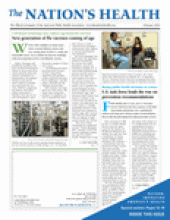Gentlemen, start your health care engines. Let’s face it guys: Studies show that on average, men just aren’t as healthy as women. Even though the life expectancy gap between men and women has narrowed, gals still outlive guys by about five years. The reasons are pretty clear: On average, men smoke and drink more than women, make far fewer visits to the doctor, get fewer preventive screenings and take greater risks than women. The result? Men tend to die younger and more often from such ailments as heart disease, cancer and stroke, as well as from injuries.
According to the American Heart Association, men have a greater risk of heart attack than women, and they have heart attacks earlier in life. Overall cancer rates are also higher for men than for women, with cancers of the lung, prostate and colon taking the greatest toll.
“We find that for men, health has not been something that has been ingrained in them since boyhood,” says Scott Williams, vice president of Men’s Health Network, a nonprofit organization focused on men’s health. “When a boy is 5 years old and falls down and skins his knees, he is told that ‘big boys don’t cry.’ That mindset sticks with that man, even when he is 50 years old and experiencing chest pain, which can be the first sign of a heart attack.”
High school- and college-age males undergo physicals for sports or school admission requirements, “but we find that at age 22 or 23 there is a kind of a cliff that they fall off of, and you may not see that man again until he is 50 and may be presenting with prostate issues,” Williams says.

Opportunities for early detection and prevention can be lost in the intervening 30 or so years, so don’t let this happen to you. Start today to make a decision to pay more attention to your body. Many of the major health risks men face, such as colon cancer and heart disease, can be prevented and treated if diagnosed early. “If you are not going to do it for yourself, do it for your family,” Williams says. “Whether it is for your son, your daughter, your partner or family, it is a way to show how taking care of your health benefits those around you.”
Know the score on your own health
Finding diseases early when they are easier to treat can make all the difference, so men should be good sports and get recommended screenings, such as blood cholesterol, blood pressure, colorectal cancer, diabetes and prostate cancer tests. Ask your doctor about which tests you should have based on your age and other health factors. Your numbers provide a picture of your health status and your risk for certain diseases and conditions, so keep track of them.
Team up for success
Thirty minutes a day of moderate physical activity on most days of the week is recommended for a healthy life. You don’t have to run marathons, but you will need to put down the remote and get up off the couch. Some fun ways to get moving include taking a brisk walk, riding your bike — wear a helmet — or enjoying a team sport. And you’ll be more inclined to stick with an exercise regimen if you do it with a buddy, says Perry Karfunkel, MD, PhD, a primary care physician in Burlington, Mass., and a member of the Men’s Health Network’s board of advisors.

Men should take care of their health for the sake of both themselves and their families.
Photos courtesy iStockphoto
“Even if it is just walking, there’s more likelihood you will actually do it if someone else is waiting for you,” Karfunkel says.
Cover the bases and take the lead
Improving your health can be as simple as getting more sleep or eating a healthier diet. Increase your intake of fruits, vegetables and whole grains and choose fat-free or low-fat milk and milk products. Eat foods that are low in saturated fats and go light on the salt shaker.
Other good advice? Take preventive medicines if you need them, stay at a healthy weight and kick the habit if you smoke, as nine out of 10 lung cancer deaths are caused by cigarette smoking. If you drink alcohol, do so in moderation or ask your doctor for advice on cutting back. Also, stay up to date with your immunizations. Get an annual flu shot and ask your health care provider about other vaccines you may need.
And listen up ladies: You play key roles in keeping the men in your life healthy. Women are often the health care leaders in the family, and it often falls to women to empower their husbands, sons, brothers and fathers to take action with their own health.
Find the time to get in the game
Making an appointment with your health care provider is an important first step toward better health.

Tell your doctor as much as you can about your health history, as well as all the medications you’re taking and any health issues you may be experiencing. Don’t hold back: Health care providers have heard it all. Also, studies show that men don’t handle stress the same way women do, so if life is throwing you a curve ball, be sure to bring it into the conversation.
>> For more information, visit www.cdc.gov/men or www.menshealthnetwork.org
- Copyright The Nation’s Health, American Public Health Association









